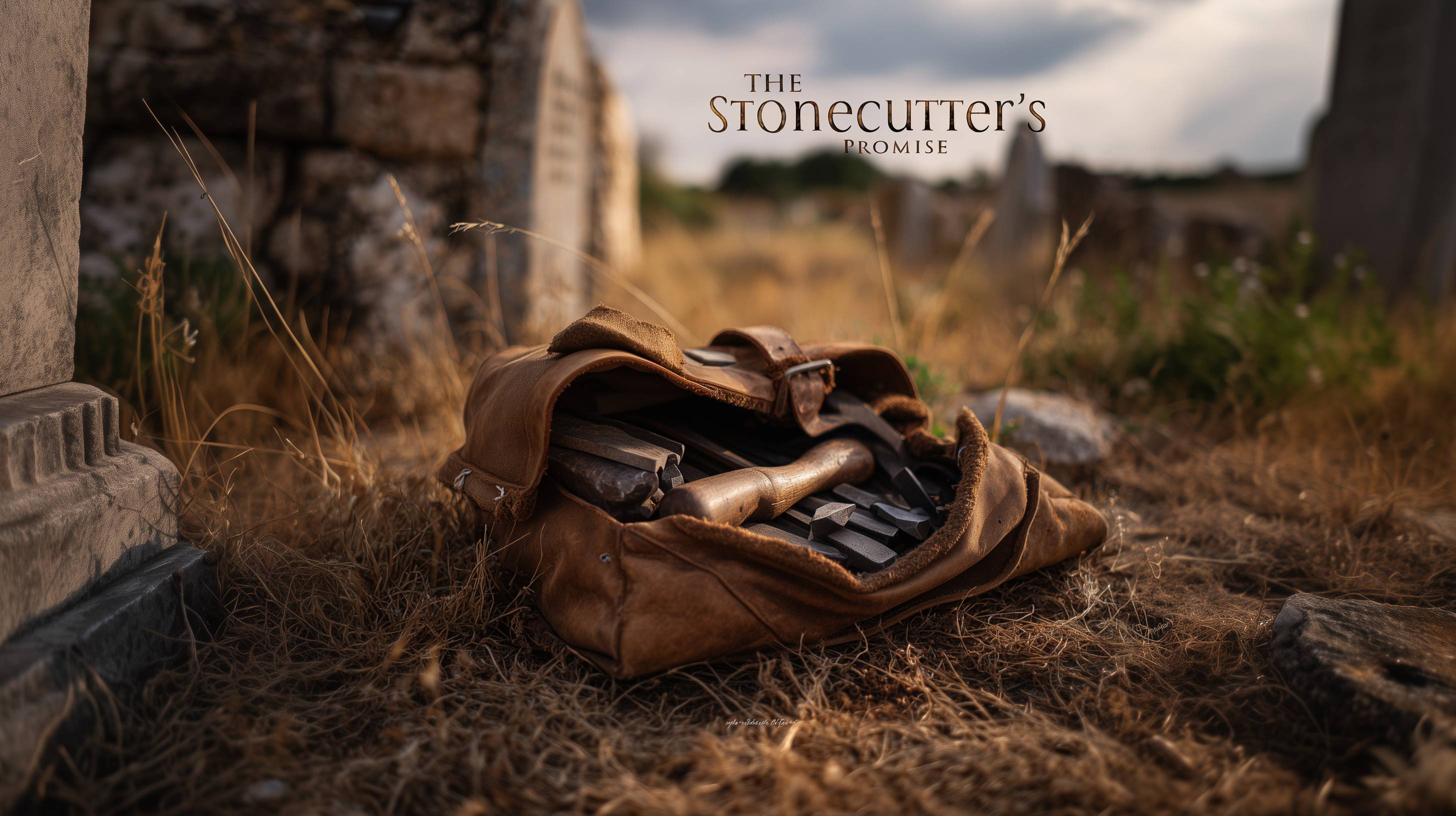A weary stonecutter’s routine job becomes an unexpected gift that restores more than a name on a grave.
The Stonecutter’s Promise follows an aging stonecutter who is hired by a young woman to restore the faded lettering on her father’s grave. He begins the work with quiet resentment, seeing it as just another job and thinking more about the appearance of the stone than the meaning of the words. But the daughter’s joy when she sees the restored inscription—words chosen by her father himself—pierces his detachment. For the first time in years, he feels the weight of what he’s given: not just a clean surface, but the return of something precious that time had tried to erase.
The Stonecutter’s Promise
It was late March, the ground still cold enough to bite the knees. The wind came in slow pushes from the west, carrying a smell of rain that never seemed to arrive.
Walt Harper came to the old cemetery with his tools slung over his shoulder, the chisel roll bumping against his back. He didn’t want the job. It was underpaid. It was fussy. He had told Mae in the office that he didn’t do “little sentimental repairs” anymore. Mae had shrugged and said there wasn’t anybody else.
“It’s a friend of Pastor Givens,” she’d said, and then, after a pause, “He’s a good customer.”
That was the way of it. A man could say no, but there was always a reason to say yes.
The stone was easy to find. It leaned in the back row, where the grass grew wild and the mower couldn’t reach. It had once been white marble, but years of weather had turned it the color of old dishwater. Lichen had taken hold in the letters until most of them were only faint shadows of themselves. The name at the top was just barely there, the dates almost gone. Below, there was an empty stretch where a sentence had been.
Walt stood a moment, shifting the chisel roll on his shoulder. The wind rattled the bare branches overhead. Somewhere a crow called and was answered.
He crouched and ran his thumb over the stone. The surface felt brittle under the grit. He could see just enough indent to guess at what had been written. Not the exact thing, but the shape of it, the rhythm of the spacing.
He didn’t care much what it had said. It was not his business to care. His work was to make it look new enough to satisfy whoever was paying. People wanted a thing to seem cared for, and that was enough for most.
He unpacked his chisels, chose the fine point, and began.
The sound was steady: tap, chip, scrape. He cut back into the ghost of each letter, not hurrying but not lingering either. It was craft, not sentiment. He replaced curves where he thought curves had been, squared off what might have been squared. Some parts were guesswork. He filled those without thinking too hard about them, the way you might patch a fence with whatever board comes to hand.
Around midday, the sun burned through the thin cloud cover. He took off his jacket and hung it on the stone. The smell of the grass in the sun came up around him, dry and sharp.
He thought of the sandwich Mae had packed in the paper bag on the seat of his truck. He thought of the job he had waiting tomorrow, a proper headstone for the new veterans’ section. Clean granite. No guessing there.
By early afternoon, he had the thing cut fresh and deep again. The name looked right enough. The dates too. And below, the sentence stretched neat and full across the base.
He sat back on his heels, brushed the stone dust from his hands, and studied it. It looked cared for now, that was certain. Whoever came to see it would feel that someone had taken time. That was the point.
He was putting the chisels away when he heard the sound of a car on the gravel lane. A blue sedan came up slow and stopped a little behind him.
The driver’s door opened and a woman got out. She was small, with a gray cardigan buttoned all the way up and a scarf knotted at her throat. Her hair was white, but her walk was quick. She carried a small purse in both hands, as if it were important to hold it steady.
“Mr. Harper?” she asked.
“That’s right,” he said.
“I’m Margaret Willis,” she said. “Pastor Givens told me you’d be here.”
She stepped up beside him and looked down at the stone. He could see her mouth open just a little. Her eyes were wet before she even spoke.
“Oh,” she said. “Oh, you found it.”
Walt shifted his weight. “Found what?”
She glanced at him, then back to the stone. She bent close and ran her fingers along the newly cut words.
“My father,” she said softly. “He used to say this to me every morning. All my childhood. I told the man who made this stone to put it here, just like he said it. Every letter.”
She read the words aloud, slowly, as if she were tasting each one. When she finished, she pressed her hand to her mouth.
“It’s perfect,” she said. “You even kept the little curl on the—” She stopped, her breath catching.
Walt stood there, unsure what to do with his hands.
“I didn’t know,” he said finally. “I just—there were marks. I filled them in the way they looked.”
She smiled at him through her tears. “Well, you must have been guided, Mr. Harper. It’s exactly right. Every letter.”
She stayed there, crouched beside the stone, tracing the inscription again and again. The wind lifted the ends of her scarf.
“It was his blessing to me,” she said. “To all of us. And now it’s here again, just as it was.”
She stood then, turning to him with both hands out. “Thank you,” she said, and took his hand in both of hers.
He felt the thin bones under her skin, the warmth of her grip. It was not the polite shake of a customer but something else. Something given freely.
She let go and went back to the stone, kneeling again, and he realized she was crying in earnest now—not the quick tears of someone touched by a small kindness, but the deep, shaking kind.
Walt looked down at his boots. The leather was dusted white from the marble. He thought about the way he had cut those letters. Quick. Not careless exactly, but without thought for the meaning.
What if he had been wrong? What if the curl she loved so much had been an accident of his own? What if the words were not her father’s words at all?
The thought settled heavy in him.
But she was smiling still, reading the sentence again as if it were a prayer.
She stayed like that for some time, and he waited with his hands in his pockets, feeling the sun go lower.
When she finally stood, she touched his arm. “I can’t tell you what this means to me.”
He nodded, but didn’t trust himself to speak.
She walked back to her car and drove away, the sound of her tires fading on the gravel.
Walt turned back to the stone. The letters were sharp in the late light, the shadows deep in each cut.
He ran his fingers over them and felt the weight of them in a way he hadn’t before. Not just stone and chisel marks. Not just the look of being cared for.
The wind moved through the grass, carrying a faint scent of rain.
He thought again: What if I had been wrong?
But the woman’s voice stayed with him—her sure, steady tone as she read.
He packed his tools slowly, the chisel roll heavier than it had been in the morning, and walked back toward the truck.
The sky to the west was darkening, and the first drops began to fall.
Read more articles
- Log in to post comments

